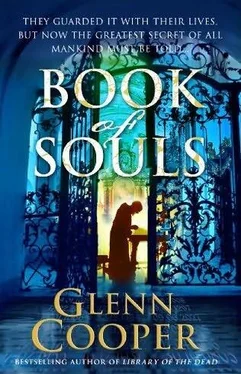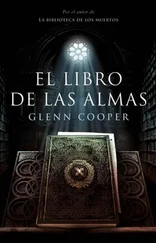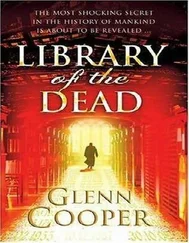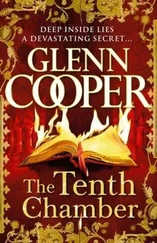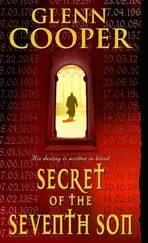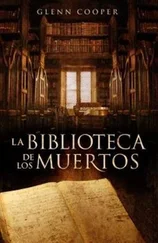Glenn Cooper - Book of Souls
Здесь есть возможность читать онлайн «Glenn Cooper - Book of Souls» весь текст электронной книги совершенно бесплатно (целиком полную версию без сокращений). В некоторых случаях можно слушать аудио, скачать через торрент в формате fb2 и присутствует краткое содержание. Жанр: Триллер, на английском языке. Описание произведения, (предисловие) а так же отзывы посетителей доступны на портале библиотеки ЛибКат.
- Название:Book of Souls
- Автор:
- Жанр:
- Год:неизвестен
- ISBN:нет данных
- Рейтинг книги:5 / 5. Голосов: 1
-
Избранное:Добавить в избранное
- Отзывы:
-
Ваша оценка:
- 100
- 1
- 2
- 3
- 4
- 5
Book of Souls: краткое содержание, описание и аннотация
Предлагаем к чтению аннотацию, описание, краткое содержание или предисловие (зависит от того, что написал сам автор книги «Book of Souls»). Если вы не нашли необходимую информацию о книге — напишите в комментариях, мы постараемся отыскать её.
Book of Souls — читать онлайн бесплатно полную книгу (весь текст) целиком
Ниже представлен текст книги, разбитый по страницам. Система сохранения места последней прочитанной страницы, позволяет с удобством читать онлайн бесплатно книгу «Book of Souls», без необходимости каждый раз заново искать на чём Вы остановились. Поставьте закладку, и сможете в любой момент перейти на страницу, на которой закончили чтение.
Интервал:
Закладка:
Spence finished, and, on cue, Alf Kenyon leapt into his own story without giving Will a chance to interrupt. Will felt like he was being played. These guys were opening their kimonos to soften him up for something. He didn’t like it, but he was curious enough to go along.
Kenyon was the son of Presbyterian ministers from Michigan. He grew up in Guatemala but was sent stateside for college. At Berkeley, he became fired up by the Vietnam War protest scene and mixed Latin-American studies with a growing sense of radicalism. Upon graduation, he ventured to Nicaragua to help peasants press land claims against the Somoza government.
By the early seventies, the Sandinista rebels were starting to get some traction in the countryside, mobilizing antigovernment opposition. Kenyon was a strong sympathizer. His work in the central highlands, however, attracted the unwelcome attention of progovernment militias, and, one day, he was surprised to be visited in his village by a cherubic young American named Tony who was about his age. Tony mysteriously knew an awfully lot about him and offered some unsolicited, friendly advice on keeping a low profile. Kenyon was on the naive side but worldly enough to recognize Tony as an agency man.
The two young men were chalk and cheese, polar opposites politically and culturally, and Kenyon angrily sent him away. But when Tony returned a week later, Kenyon admitted to Will that he was happy to see him again, and brightly blurted out, “I don’t think either of us really knew we were gay!” Will assumed the Tony story had a broader purpose than a disclosure of the man’s sexual identity, so he let Kenyon ramble on in his slow, precise way.
Despite their political differences, the men became friends, two lonely Americans on their opposing missions in the hostile rain forest, one Catholic, one Protestant, both devout. Kenyon came to understand that a different CIA man would have probably thrown him to the wolves, but Tony showed genuine concern about his safety and even tipped him off to a militia sweep.
Then, with Christmas 1972 approaching, Kenyon made plans to spend a week in Managua. Tony came to visit, and begged, “Yes, begged me!” he said, not to go to the capital. Kenyon refused to listen until Tony told him something that would change his life.
“There will be a disaster in Managua on December 23,” he said. “Thousands will die. Please don’t go.”
“Do you know what happened on that day, Mr. Piper?”
Will shook his head.
“The great Nicaraguan earthquake. Over ten thousand killed, three-quarters of all buildings destroyed. He wouldn’t say how he knew, but he scared me silly, and I didn’t go. Afterward, when we became, shall I say, closer, he told me he had no idea how our government knew what was coming, but the prediction was in the system, and he understood it was as good as gold. Needless to say, I was intrigued.”
Tony was eventually transferred to another assignment, and Kenyon would leave Nicaragua when full-blown civil war broke out. He returned to the States to get a Ph. D. at Michigan. Apparently Tony had put Kenyon’s name into the system, and Area 51 recruiters got wind of it because they were on the lookout for a Latin-American specialist. One fine day he was visited at his Ann Arbor apartment by a navy man who startled him by asking if he’d like to know how the government knew about the Managua quake.
He most certainly did. The hook was set.
He joined Area 51 a few years after Spence and was put to work on the Latin-American desk. He and Spence, both cerebral types who loved to talk politics, gravitated to each other and quickly became commuting buddies on the daily shuttle flights between Las Vegas and Groom Lake. Over the years, the Spence clan, for all intents and purposes, adopted the single man and hosted him at holidays and family occasions. When Martha died, Kenyon was Spence’s rock.
They retired on the same day in 2001. At the EG &G shuttle lounge at McCarran Airport on their last return flight, the men hugged each other and got misty-eyed. Spence stayed at his country-club estate in Las Vegas, Kenyon moved to Phoenix to be near his only family, a sister. The men stayed close, bonded by their shared experiences and the 2027 Club.
Kenyon stopped talking. Will expected Spence to pick up the stream again but he too was silent.
Then, Kenyon asked, “Could I ask if you’re a religious man, Mr. Piper?”
“You can ask, but I don’t see it as your business.”
The man looked hurt. Will realized the two of them had been sharing their personal lives in hopes of getting him to open up to them. “No, I’m not very religious.”
Kenyon leaned forward. “Neither is Henry. I find it remarkable that anyone who knows about the library isn’t.”
“To each, his own,” Spence said. “We’ve had this discussion a thousand times. Alf is in the camp that the Library proves that God exists.”
“There’s no other explanation.”
“I don’t want to relitigate the matter just now,” Spence said wearily.
“The thing that always tickled me,” Kenyon said, “is that I was born into the perfect religion. As a Presbyterian I was hardwired to incorporate the Library into my spiritual life.”
“The man is still acting out the Protestant Reformation,” Spence joked.
Will knew where he was going. Over the last year, he’d thought about these things himself. “Predestination.”
“Precisely!” Kenyon exclaimed. “I was a Calvinist before I had a concrete justification for being one. Let’s just say the Library turned me into a High Calvinist. Very doctrinaire.”
“And very opinionated,” his friend added.
“I’ve spent my retirement becoming an ordained minister. I’m also writing a biography of John Calvin, trying to figure out how he had the genius to get his theology so right. Frankly, if it weren’t for Henry’s passing, I’d be happy as a clam. Everything makes sense to me, which is a nice place to be.”
“Tell me about the 2027 Club,” Will said.
Spence hesitated at the wheel as a light turned green. He had to decide whether to swing through the park again. “As I’m sure you know, the last book of the Library ends on the ninth of February, 2027. Everyone with no recorded date of death is BTH, beyond the horizon. Everyone who’s ever worked at the Library has endlessly speculated why the books ended and who was responsible for them in the first place. Was the work of these savants or monks or fortune-tellers or extraterrestrials-yes, Alf, my explanation is as good as yours-was it interrupted by external factors like war, disease, natural disaster? Or is there a more sinister explanation that maybe the people of earth ought to know about. As far as any of us are aware, there was never much of an official effort to understand the significance of the horizon, as it’s called. The Pentagon’s always too focused on mining the data and generating intelligence findings. There’s a lot of badness in the cards, megadisasters in the not-so-distant future that our folks are obsessing over. Something big is looming in Latin America, truth be told. Maybe as 2027 gets closer, it’s going to occur to these geniuses in Washington that we really ought to know what the hell is going to happen the day after. But let me tell you, Mr. Piper, one’s curiosity about the horizon doesn’t cease with retirement. The 2027 Club was formed in the 1950s by some ex-Area 51 types as part retirement social club, part amateur sleuthing group. It’s all very sub rosa, violates our retirement agreements and all that, but you can’t stamp out human nature. We’re curious as hell, and the only folks we can talk to are ex-employees. Plus it gives us a chance to get together and drink adult beverages.”
The long soliloquy winded him. Will watched his chest heave.
Читать дальшеИнтервал:
Закладка:
Похожие книги на «Book of Souls»
Представляем Вашему вниманию похожие книги на «Book of Souls» списком для выбора. Мы отобрали схожую по названию и смыслу литературу в надежде предоставить читателям больше вариантов отыскать новые, интересные, ещё непрочитанные произведения.
Обсуждение, отзывы о книге «Book of Souls» и просто собственные мнения читателей. Оставьте ваши комментарии, напишите, что Вы думаете о произведении, его смысле или главных героях. Укажите что конкретно понравилось, а что нет, и почему Вы так считаете.
